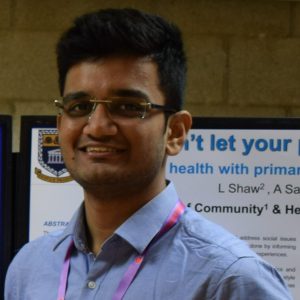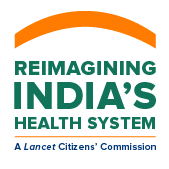In Conversation: Parth Sharma, Junior Resident, Department of Community Medicine, Maulana Azad Medical College, Delhi
January 09, 2023

In 2017, I accompanied Dr. Sushil John to a rural village near Vellore for a health camp. As a medical student, it amazed me when I saw him treat various patients. Children with pneumonia, adults with diabetes, and adolescents with mental illnesses, Dr. Sushil could treat them all. Various other such observations in the Low-Cost Effective Care Unit (LCECU) and Community Health and Development (CHAD) department at Christian Medical College, Vellore made me realize the importance of primary care in my undergrad days. This understanding improved during my internship and at the end of 2 years of my service obligation, after seeing patients dying due to curable cancers or due to complications of diabetes and hypertension, I was sure that I needed to work to improve primary health care in the country.
I graduated from CMC, Vellore in 2019 and am currently a first-year MD Community Medicine resident at Maulana Azad Medical College, Delhi. I am working with a non-profit research organization, ASAR, on projects related to palliative care, and mental health. I am also the Regional Leader for South East Asia Region in the International Working Group for Health System Strengthening (IWG-HSS), a global action group advocating for better health systems through research. To address poor health awareness, I founded Nivarana in July 2022. Nivarana is a public health platform that educates people through evidence-backed articles, and online sessions and brings together public health enthusiasts to discuss evidence-backed solutions to health and social problems.
As I ultimately want to work to improve primary healthcare in the country, getting involved in the Human Resources for Health workstream in the Commission was a great opportunity for me. Our scoping review aims to understand how human resources for health can be strengthened in India. As a subproject, I am also looking at the use of digital health by human resources for health in India and the barriers and facilitators associated with their use.
Many would argue that the lack of human resources for health, more in rural than urban areas, is the biggest challenge for achieving UHC in India. But in my opinion, it ultimately comes down to two core problems:
1. Lack of compassionate teaching and
2. Glorification of specialization.
These two have led young doctors to get stuck in a rat race where they start their medical education journey in high school and end it once they are highly sub-specialized. A resource-limited primary health system then can not employ these highly specialized health professionals and as these health centers stay devoid of human resources they tend to stay the same or even worsen (if that is possible), forming a vicious cycle. I was fortunate to get trained by highly compassionate doctors in an institute that kept me in touch with the ground reality while turning me into a skilled health professional. A similar training program at the national level could solve these problems and help us in achieving UHC.
Besides generating quality evidence to guide the stakeholders, the Commission has uplifted many young researchers like me and given us the chance to interact with pioneers in the field of public health. I hope the Commission continues to give such opportunities to budding public health professionals so they can advocate for a better health system now and in the years to come.
